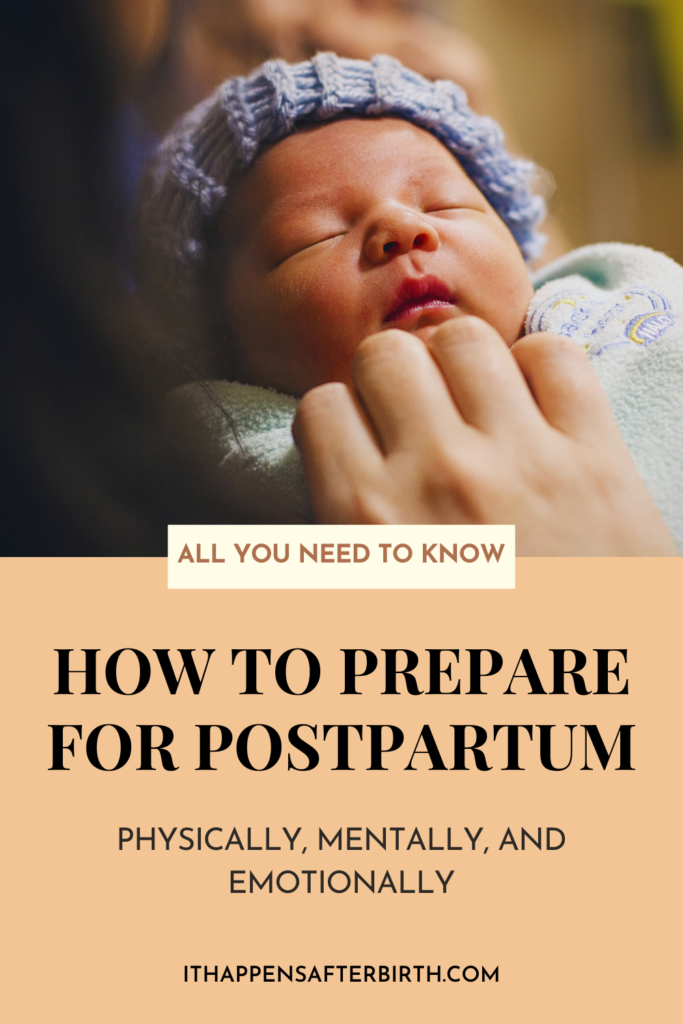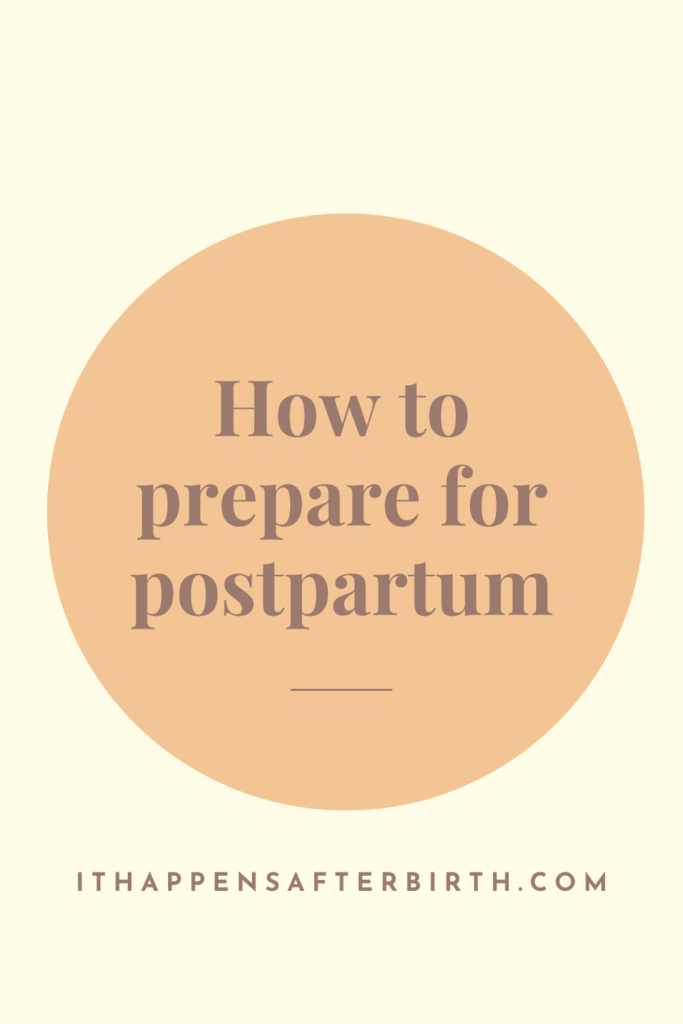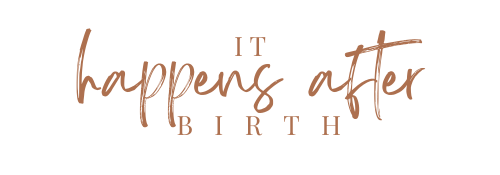This will get you started on all you need to know to prepare for postpartum- physically, mentally, and emotionally.

You may feel prepared for pregnancy, labor, and birth. But do you feel prepared for postpartum?
It’s a part of the childbearing year that often gets overlooked. It’s understandable! Birth feels like the momentous finish, and postpartum just… comes after.
The truth is that preparing for postpartum is as important as preparing for birth.
Is it really possible to be prepared for postpartum?
Absolutely! You can prepare for postpartum just as you do for birth. Which means:
- Educating yourself about common postpartum issues and complications
- Learning what your options are if issues do arise
- Pinpointing your ideal postpartum, and having a back-up plan if things don’t work out the way you want them to
- Preparing your body and mind for the physical and mental aspects of postpartum recovery
And most importantly
- Letting go of the expectation that you can control the outcome, but trusting that you’ll know what to do in the meantime.
How do I start to prepare for postpartum?
There are lots of ways to begin preparing for the time after birth! Physically. mentally, and emotionally. Even spiritually!
This will be a time of intense growth, recovery, and change. It’s better to be ready in all aspects instead of just one.
You can start by finding some trusted resources to get your information from. (This blog is one of them! But there are many other sources too.) If you can, find a few that you really trust to be honest and accurate. This will save you from going down an internet chasm every time you have a question.
Check out:
Postpartum Support International
Kelly Mom (for breastfeeding)
These are great starting places for information!
How do I mentally prepare for postpartum?
The most important way to prepare mentally is to know what you’re preparing for. Just like birth, postpartum is unpredictable. There are lots of possibilities and issues that can go along with it, but there is no way to know which specific things will be an issue in your postpartum. And there is no way we can be fully prepared for every situation- but we can absolutely familiarize ourselves with the more common ones.
Here are the core postpartum topics that I would recommend learning about.
- The way your body typically heals after birth.
- The symptoms and risks of a postpartum infection.
- Common feeding issues (for both breast- and bottle-feeding- you can check out my post on latching here).
- Postpartum mood disorders.
- Typical newborn sleep and behaviors (this will help immensely when you feel like you’re doing something “wrong”, or are afraid that something is going wrong with your baby).
Familiarizing yourself with these topics will give you a head start on some situations that could come up after you give birth to your baby. Knowing what to expect, what your options are, and (perhaps most importantly) when something isn’t normal and needs intervention, will save you immense stress at a vulnerable time in your life.
How do I physically prepare for postpartum?
There is some disagreement as to whether you can truly prepare your body for postpartum. In reality, a lot of the recommended exercises may or may not make things easier for your body. It will ultimately come down to your unique experience.
Some things used to be recommended as helpful, but were actually pointless- or even harmful. (Such as rubbing your nipples with a towel to “toughen them up”- Utterly ridiculous!)
Kegels are a familiar, often-recommended exercise to help with both birth and postpartum recovery. There has been some talk in recent years as to whether kegels are always beneficial, or if doing them incorrectly causes more harm than good. If you feel up to trying it, you can find a tutorial here.
Kegels aside, pelvic floor-strengthening exercises are very beneficial. Doing a few simple exercises per day can help not only with the length of labor, but also the length of postpartum recovery. Continuing these exercises after birth will bring even more good results (and lessen the chances that you’ll pee a little every time you laugh or sneeze!).
Click here for a few simple exercises you can start today.
Any basic exercise can help strengthen and support your body for labor and recovery. Walking, dancing, swimming, and stretching are all great ways to activate your muscles, release stress, and increase dopamine. This will help your physical health in the short and long term. Plus, it’s beneficial to your mental health!
Eating nourishing foods can also set you up for a smoother postpartum recovery. Even one healthy, nourishing meal per day can help strengthen and replenish your body. And your body will need plenty of replenishing during postpartum recovery! Some good foods to include are:
- Eggs
- Salmon
- Whole grain oats
- Quinoa
- Bone broth
- Ginger
- Cinnamon
- Almonds
- Avocados
Pin for later!

How do I emotionally prepare for postpartum?
This one is a little tougher to cover.
The truth is, you won’t have any idea what your emotions will look like following birth. You can expect things like weepiness, exhaustion, sadness, and mild brain fog. These are typical baby blues symptoms that up to 80% of all parents will experience after birth. Hormonal fluctuations play a large part in these!
But you can’t predict how you’ll actually feel once you’re in postpartum.
You might feel some sadness, intense emotions, or only happiness.
So how do you prepare for that?
Reading up on normal emotions and mood disorders after birth can reduce the factor of the unknown, which helps you navigate when things start to get murky. It can encourage you that even if your feelings start to get scary, you can recognize what’s happening and know that there is a way to get back to yourself.
The most important preparation for your emotional health is: have safety nets in place.
Decide beforehand what your course of action will be if you start to feel overwhelmed, depressed, anxious, or any other kind of way that negatively affects you. Decide who you can talk to about it. Who can you call? How do you want your partner to support you? If it becomes a crisis, is there a trusted doctor or therapist who specializes in postpartum recovery that you can turn to?
Obviously, plans might not turn out to be feasible (or even what you want) when the feelings are actually happening. But having any kind of plan gives you clarity and options in a time that can often be overwhelming and difficult.
Being well-prepared physically and mentally can also help with the emotional aspect of postpartum recovery, but it’s not a guarantee. Even the best preparation doesn’t promise a wonderful, stress-free outcome. Things happen.
There are a couple other options for supporting emotional health during postpartum recovery.
(I am not a medical professional, so please ask your care provider before partaking in any products.)
St. John’s Wort has been shown to have beneficial affects on mental health such as depression, though studies have never been done on pregnant or postpartum women.
Other women have reported that taking encapsulated placenta made an immense difference in their emotional state after birth. Some women state that encapsulated placenta had the opposite affect and worsened their emotional health after birth. Minimal studies have been done on the risks/benefits of taking placenta, so do your research and consult with your care provider before making your decision.
What else should I do?
At the risk of repeating myself- educate, educate, educate. The more that you know going into postpartum, the better you’ll be prepared to handle it! Have your spouse/partner or support person learn about it too, just as you learn about birth. Birth lasts for hours, but postpartum lasts for weeks.
Create a written postpartum plan (similar to what you would create for birth) to remind yourself of what’s most important to you and what the options are if things don’t go the way you’d hoped. This can include preferences, what you absolutely do or do not want, names and phone numbers of people who can help with different issues (like breastfeeding, mood disorders, etc.), and even how you want your other children cared for or your house cleaned.
Another good way to prepare for postpartum is to create a basket of postpartum essentials to have on hand for after your baby arrives. Depending on how you plan to care for yourself + baby, this may look different from parent to parent. Some items to plan on or consider would be:
- Soothing pads/wipes for your vaginal area
- Peri bottle
- Manuka honey (read about the benefits of manuka honey on wound healing)
- Hair ties
- Lip balm
- Nipple balm (this is a personal preference- some women swear by it, others point out that it may just cover up the symptoms of a larger latching problem)
- Thermometer (for you and for baby)
- Nail clippers
- Postpartum pads or adult diapers (not a fun reality, but it can save you the first few days postpartum.)
- Heating pad, or compress which can be heated
- Vitamins or supplements, including prenatals (PLEASE verify with your care provider before taking any form of vitamins or supplements.)
- An after-ease tincture for after-birth contractions (PLEASE verify with your care provider before taking any kind of tinctures.)
- Electrolyte replenisher, like Gatorade or coconut water
Prepared for postpartum
To sum up, prepare for postpartum by:
- Learning about postpartum topics
- Finding trusted sources
- Practicing pelvic floor exercises
- Eating good, nutritious foods
- Creating a postpartum plan
- Gathering needed supplies
- Communicating with your support people
Have plan A, B, and C at the ready, because the more options you have, the better you’ll be able to make adjustments on the fly.
But ultimately, prepare for the unexpected.
Each baby’s birth is going to be very different. And so will each recovery! Postpartum doesn’t have a handbook, but with the right amount of support and education, you can have a solid foundation to a smoother postpartum recovery.

